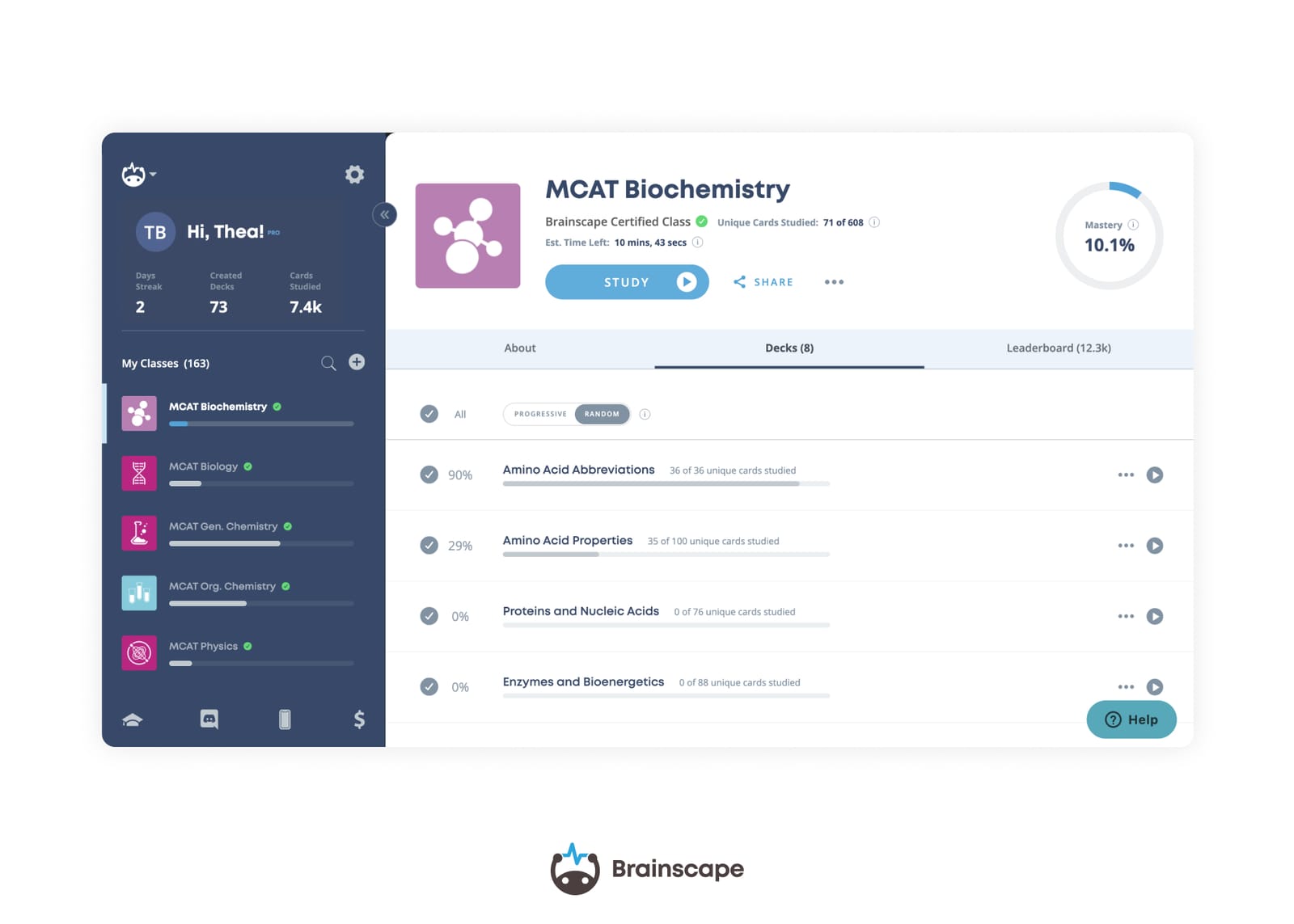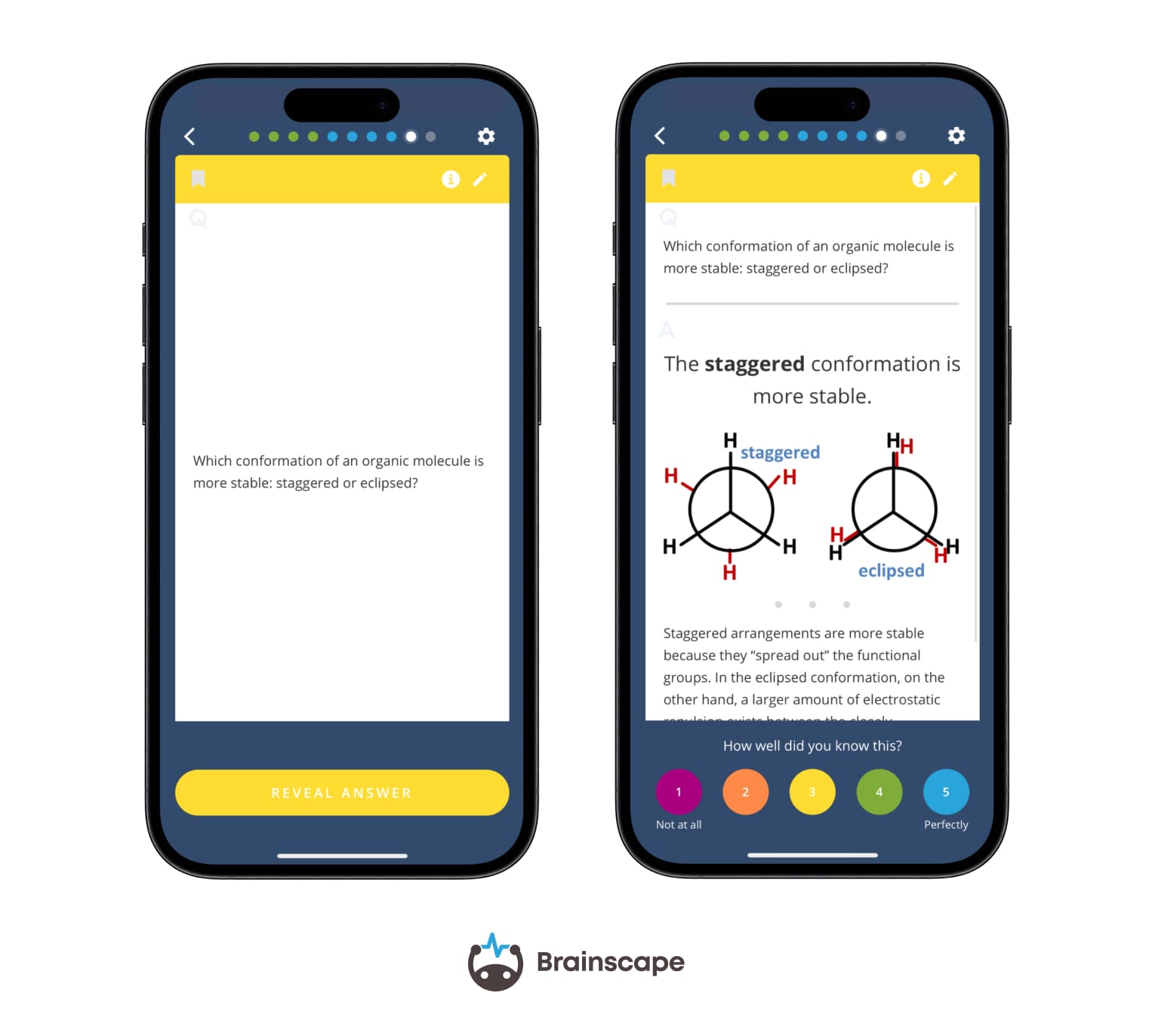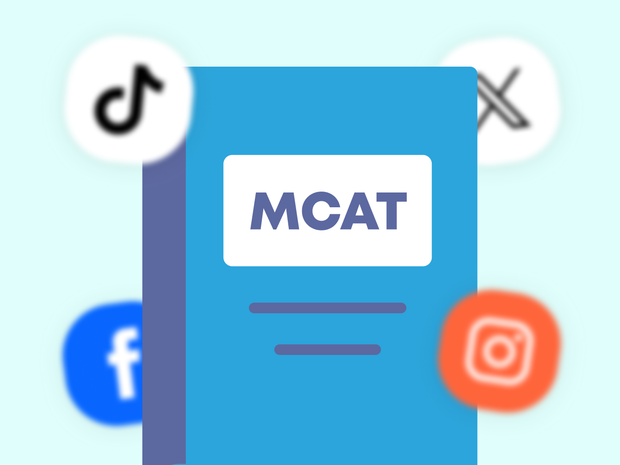When Clara Gillan was studying for the MCAT in the summer after her junior year in college, she was living in a place that was, for all intents and purposes, a frat house. It was technically an apartment complex, but parties were ubiquitous, random friends of friends of friends were constantly showing up unannounced, and there was always a dog, although nobody seemed to know whose it was.
It wasn’t the most conducive environment for MCAT study.
Now, as an MCAT tutor and partner of the Brainscape team, who helps students prepare for this high-stakes exam, she runs into students with similar problems all the time. For example, the guy who lived with a large family who didn’t respect boundaries, or the army captain who had to spend most of her MCAT study time in the barracks.
Today, Clara is going to help us answer a question that isn’t MCAT-specific but is highly MCAT-relevant: “How can I avoid distractions when I need to study?”
That’s exactly what we’re going to address in this guide with a series of MCAT studying tips and habits for eliminating distractions and improving focus.
MCAT Tips: How Can I Avoid Distractions?
The most obvious answer to this question is: don’t study at home! Or at least make sure that home isn’t the only place available to you to study. At home, there are people, pets, and pot plants that need your attention; and there are endless plinking devices, a bed begging you to take a nap, and—temptress of all temptresses—NETFLIX.
You will spend quite a bit of time studying at home: that’s unavoidable. But it’s a smart idea for you to have trusted alternatives (for those days your dog is being particularly needy) and here are just a few of our favorites ...
Tip 1: Study At Your Local Public Library
Find the public libraries closest to where you live, where you work, or along your commute, or other routes you commonly take. They’re quiet, they usually have publicly available WiFi and computers, and—unlike a lot of coffee shops—they have tons of available power outlets.
So, if you ever wake up one morning and feel like it just isn’t going to be a productive day for MCAT studying, try taking a short trip to a public library near you and familiarizing yourself with the best study spots.
Tip 2: Study At Your Local Coffee Shop
Of course, maybe no libraries are available near you, or maybe you desperately need a place to study outside the house on a government holiday, when libraries are closed. In this case, coffee shops can be a good alternative, but keep in mind that they can be noisy, seating can be limited, and power outlets will almost definitely be few or nonexistent.
This is going to sound like it’s coming straight out of the 2000s, but one way to deal with this is to specifically search for “internet cafes” near you. These facilities exist in pretty much every mid-sized or larger city, and they’re much more likely to have available seating and power outlets than your average Starbucks.
Just keep in mind that you might need to buy a cappuccino or other small item in exchange for sitting judgment-free for a while.
Other MCAT studying tips on where you might find a quiet place to concentrate:
- A family or friend’s home or apartment while they’re at work, or with the understanding that they won’t bother you.
- A local park or green area where you can spread out your books, notes, and devices with just enough people nearby to be safe. Also, a bathroom close by wouldn’t hurt.
- There’s something about the tranquil, antiquated atmosphere in a museum that is just so conducive to profitable studying. Plus, a full day of uninterrupted MCAT study is worth the price of admission, and you can station yourself in the café or on a bench in front of your favorite artwork or exhibit.
- If you’re really desperate for solitude (and can afford the expense), rent a cabin or a room in a hotel, motel, or inn for a few days of gloriously distraction-free MCAT study!
MCAT Tips: How To Avoid MCAT Study Distractions At Home
Since you can’t always study away from your home, here are some MCAT studying habits and tips that’ll help you create a distraction-free oasis.
The first thing we recommend is that you perform a sort of audit of the distractions around you. That is, try studying for a few days in your room and casually see what bothers you. In particular, try to gauge whether the distractions at home are similar to what you might reasonably experience in an MCAT testing center, or whether they’re more serious.
As examples, say that the air conditioner in your building is loud, or that you have a roommate with the annoying study habit of sighing loudly and rustling his papers. These are absolutely within the realm of possibility of distractions you could experience during your actual MCAT, so it’s advisable to stay where you are and see if you can get used to them!
Tip 3: Get Noise-Canceling Earphones
Regardless of the source of the noise or the type of distraction, one thing we highly recommend for distraction-free MCAT studying is a cheap noise-canceling headset. This helps enormously, and it’s something you’ll be given access to during your official MCAT, so it’s an opportunity to mirror test-like conditions—a win-win!
But what if the distractions around you are more … distracting? Like: your mom constantly barging in on you with random questions, or your roommate fighting with his girlfriend over something daft, like him leaving his dirty socks on the sink again.
The crucial element of these distractions isn’t just that they’re loud—that would be mitigated by the aforementioned noise-canceling headset—but rather that they’re unpredictable and potentially directed at you, so they’re difficult to anticipate or ignore.
In this case, assuming that you can’t just leave to study elsewhere, you really only have two methods of recourse:
- Talk to the people causing the distractions, or
- Adjust your studying.
MCAT Studying Tips: Talk To The People Causing The Distractions
The first of these is something that you should try whenever confronted with a serious distraction. Gently tell your mother or roommate that you really need disruption-free MCAT study time between, for example, 9 am and 3 pm, and that your career as a medical professional really hinges on you getting that.
If that works, fantastic! If it doesn’t (because your mom’s boundary issues are so cripplingly pathological that she cannot leave you alone), then you may need to resort to the second option.
Also, it might be time to move out. Just saying.
Tip 4: Adjust Your MCAT Study Habits
Adjusting your MCAT study habits doesn’t feel ideal, but the truth is that we all have tasks we need to accomplish throughout the day, other than studying, like cleaning and laundry. Schedule these for the times when your house is typically the most distracting, and study when it is typically the least.
If your distractors are out of the house, work through those Critical Analysis and Reasoning Section (CARS) passages that require intense focus, and if they’re home and, well, being themselves, do something less thought-intensive, like reviewing hormones or amino acids.
In these situations, we still recommend doing everything you can to find a library where you can at least take full-length MCAT practice tests without distraction, since those are all-day affairs and virtually impossible to shoehorn into quiet times. But for practically everything else, this strategy can definitely make the best of the situation.
How Can You Use Digital Flashcard Apps To Sneak In Study Anytime, Anywhere?

A really helpful study tool that’s perfect for getting quality studying done, whether it’s a quick 5 minutes or a marathon three-hour session—and whether you’re at home or out and about, escaping the distractions of home—is a digital flashcard app.
Research indicates that using digital flashcards leads to higher MCAT scores because they employ both active recall and spaced repetition.
With active recall, you practice pulling an answer directly from memory rather than recognizing it from a list or highlighted notes. This helps you learn more than twice as fast as traditional study methods.
Spaced repetition involves reviewing information at gradually increasing intervals, which helps move knowledge into long-term storage much more effectively.

Adaptive flashcard platforms like Brainscape or Anki apply these principles automatically, significantly improving test scores for medical students. In fact, one study of 260 medical students split them into two groups: one studying with spaced repetition and one without. The students who used spaced repetition scored double the mark on a test of the same knowledge after 29 days. In summary, no other technology is as effective for medical students as digital flashcards.
How Can You Build The Right MCAT Study Habits?
Being able to cope with distractions and a lot of incoming information at once is a pretty important skill for a medical student and, eventually, a doctor to have. So, while learning to negotiate distractions during MCAT study may feel like a total pain in the arse, with practice, you’ll figure out how and where you get your best work done, and what to do about the obstacles in your path (or how to ignore them).
You’ll develop a daily rhythm for your studies, and when one environment doesn’t work, you’ll be able to quickly uproot and transition to another. And with a digital flashcard app like RemNote or Brainscape on your phone, any free or idle time you have is an opportunity to get quality learning done.
Additional Reading
- How To Study For MCAT More Efficiently
- Taking The Day Off During MCAT Prep: Good Or Bad?
- Dropping A Course (Especially A Premed Course!): Is It Ever The Right Decision?
References
Deng, F., Gluckstein, J. A., & Larsen, D. P. (2015). Student-directed retrieval practice is a predictor of medical licensing examination performance. Perspectives on Medical Education, 4(6), 308–313. https://doi.org/10.1007/s40037-015-0220-x
Dobson, J. L. (2012). Effect of uniform versus expanding retrieval practice on the recall of physiology information. Advances in Physiology Education, 36(1), 6–12. https://doi.org/10.1152/advan.00090.2011
Karpicke, J. D. (2012). Retrieval-based learning: Active retrieval promotes meaningful learning. Current Directions in Psychological Science, 21(3), 157-163.
Kang, S. H. (2016). Spaced repetition promotes efficient and effective learning. Policy Insights from the Behavioral and Brain Sciences, 3(1), 12–19. https://doi.org/10.1177/2372732215624708
Kerfoot, B. P., Shaffer, K., McMahon, G. T., Baker, H., Kirdar, J., Kanter, S., Corbett, E. C., Berkow, R., Krupat, E., & Armstrong, E. G. (2011). Online “spaced education progress-testing” of students to confront two upcoming challenges to medical schools. Academic Medicine, 86(3), 300–306. https://doi.org/10.1097/acm.0b013e3182087bef
